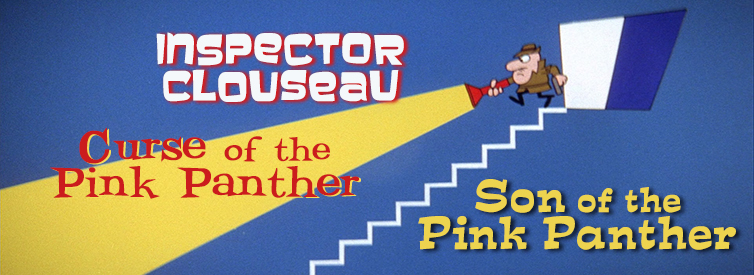
INSPECTOR CLOUSEAU
Color, 1968, 95 mins. 52 secs.
Directed by Bud Yorkin
Starring Alan Arkin, Frank Finlay, Delia Boccardo, Barry Foster, Patrick Cargill, Beryl Reid
CURSE OF THE PINK PANTHER
Color,
1983, 110 mins. 37 secs.
Directed by Blake Edwards
Starring Ted Wass,
SON OF THE PINK PANTHER
Color, 1993, 92 mins. 49 secs.
Directed by Blake Edwards
Starring Roberto Benigni, Herbert Lom, Claudia Cardinale, Robert Davi, Debrah Farentino, Jennifer Edwards, Mark Schneider, Burt Kwouk
Kino Lorber (Blu-ray) (US RA HD), MGM (DVD) (US R1 NTSC) / WS (2.35:1) (16:9)
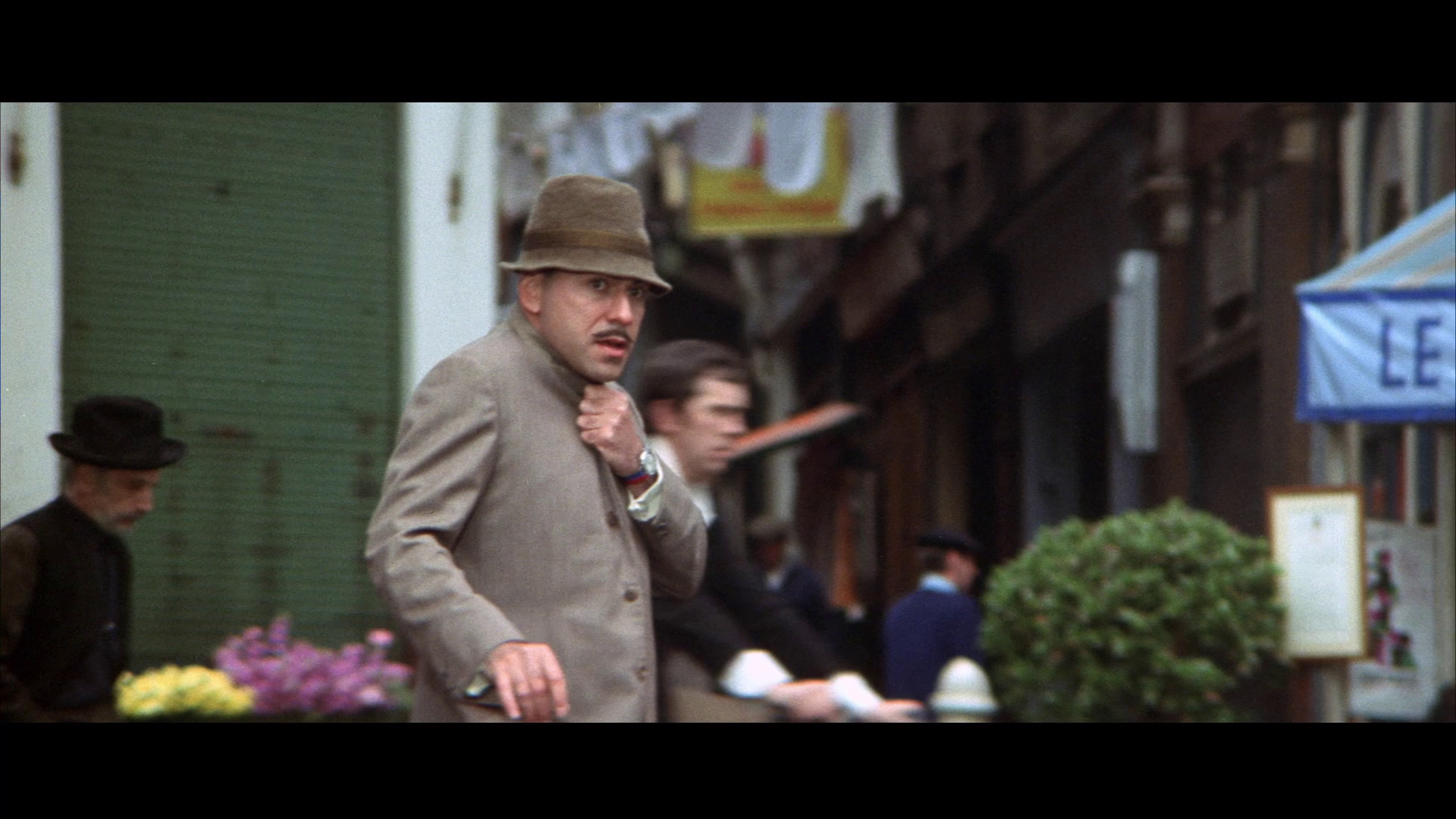
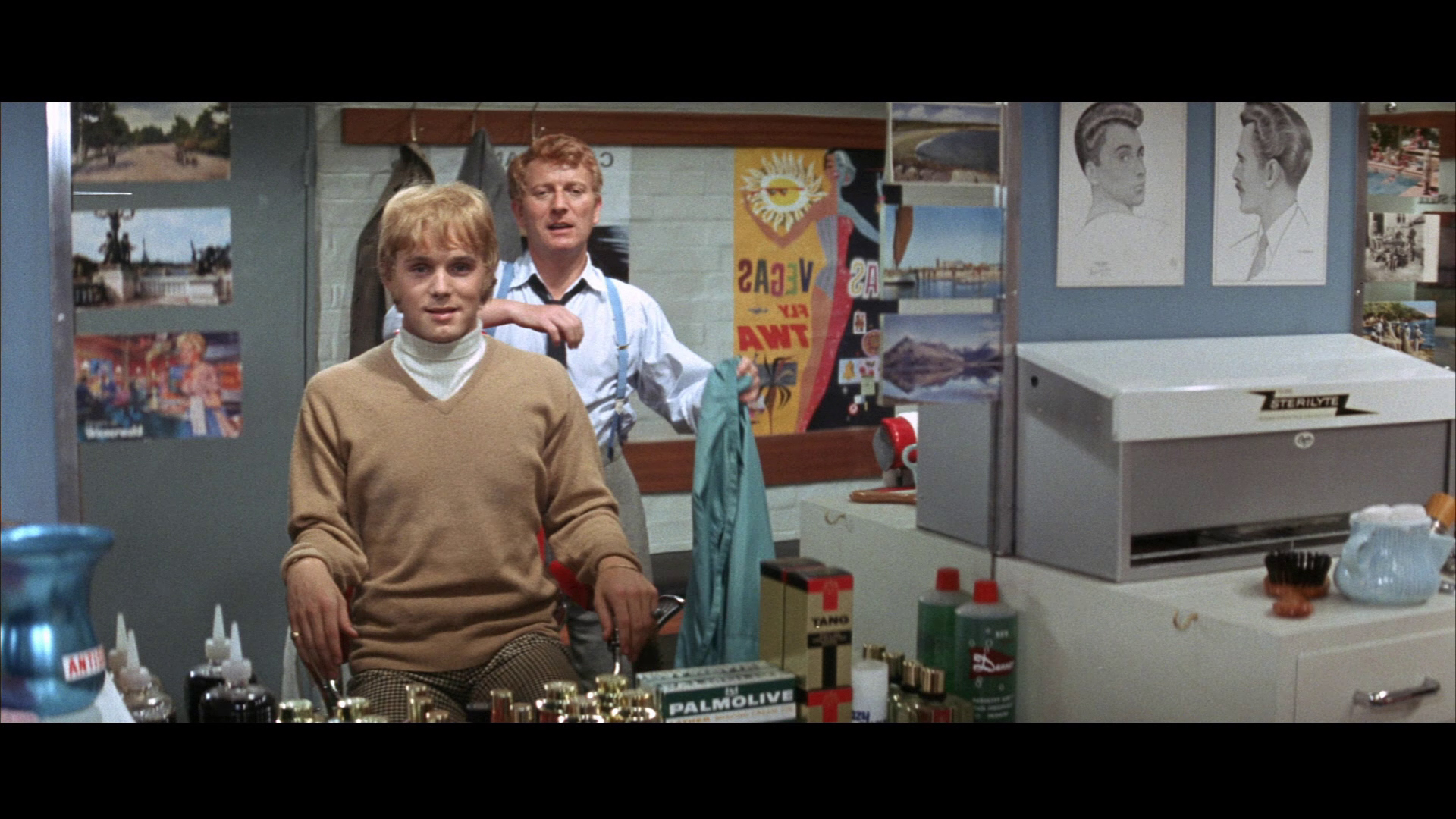 Though it wasn't exactly intended as a long-running film series in the beginning, no run of movie comedies has held quite the same place in viewers' hearts as the slapstick adventures of Inspector Clouseau that began with a glossy widescreen European heist film called The Pink Panther in 1963. Part of a streak of genre-hopping hits by Blake Edwards commenced with Breakfast at Tiffany's in 1961, it was intended as a star vehicle for David Niven and Robert Wagner with Peter Sellers cast as the clumsy, heavily accented French inspector involved the pilfering of the valuable titular diamond. Of course Sellers stole the entire film and earned a second film all to himself, A Shot in the Dark, written by The Exorcist's William Peter Blatty with Edwards at the helm again. That seemed to be it for the director and star, who expressed no interest to team up for a third outing despite the desires of The Mirisch Company and United Artists to keep it going, especially with the animated Pink Panther and Inspector shorts inspired by the films' iconic credit sequences still going strong.
Though it wasn't exactly intended as a long-running film series in the beginning, no run of movie comedies has held quite the same place in viewers' hearts as the slapstick adventures of Inspector Clouseau that began with a glossy widescreen European heist film called The Pink Panther in 1963. Part of a streak of genre-hopping hits by Blake Edwards commenced with Breakfast at Tiffany's in 1961, it was intended as a star vehicle for David Niven and Robert Wagner with Peter Sellers cast as the clumsy, heavily accented French inspector involved the pilfering of the valuable titular diamond. Of course Sellers stole the entire film and earned a second film all to himself, A Shot in the Dark, written by The Exorcist's William Peter Blatty with Edwards at the helm again. That seemed to be it for the director and star, who expressed no interest to team up for a third outing despite the desires of The Mirisch Company and United Artists to keep it going, especially with the animated Pink Panther and Inspector shorts inspired by the films' iconic credit sequences still going strong.
Finally in 1968 audiences got the real odd man out in the original cycle, Inspector Clouseau, which had TV workhorse and future Blade Runner producer Bud Yorkin taking over as director with an oddly cast Alan Arkin taking over as Clouseau. Far more nerdy and 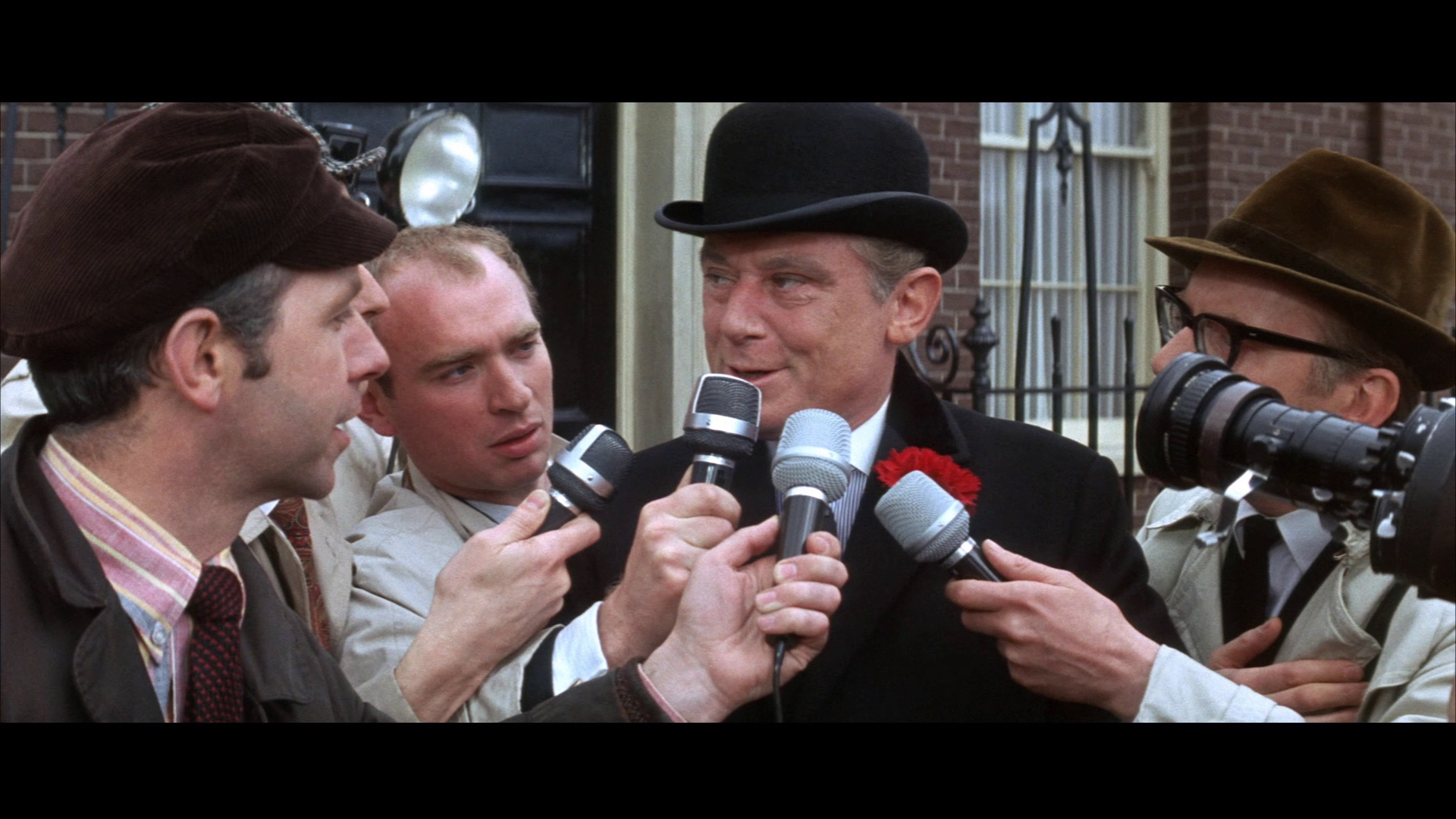 temperamental than Sellers' interpretation, Arkin would have probably been better received had he been playing a character with
temperamental than Sellers' interpretation, Arkin would have probably been better received had he been playing a character with 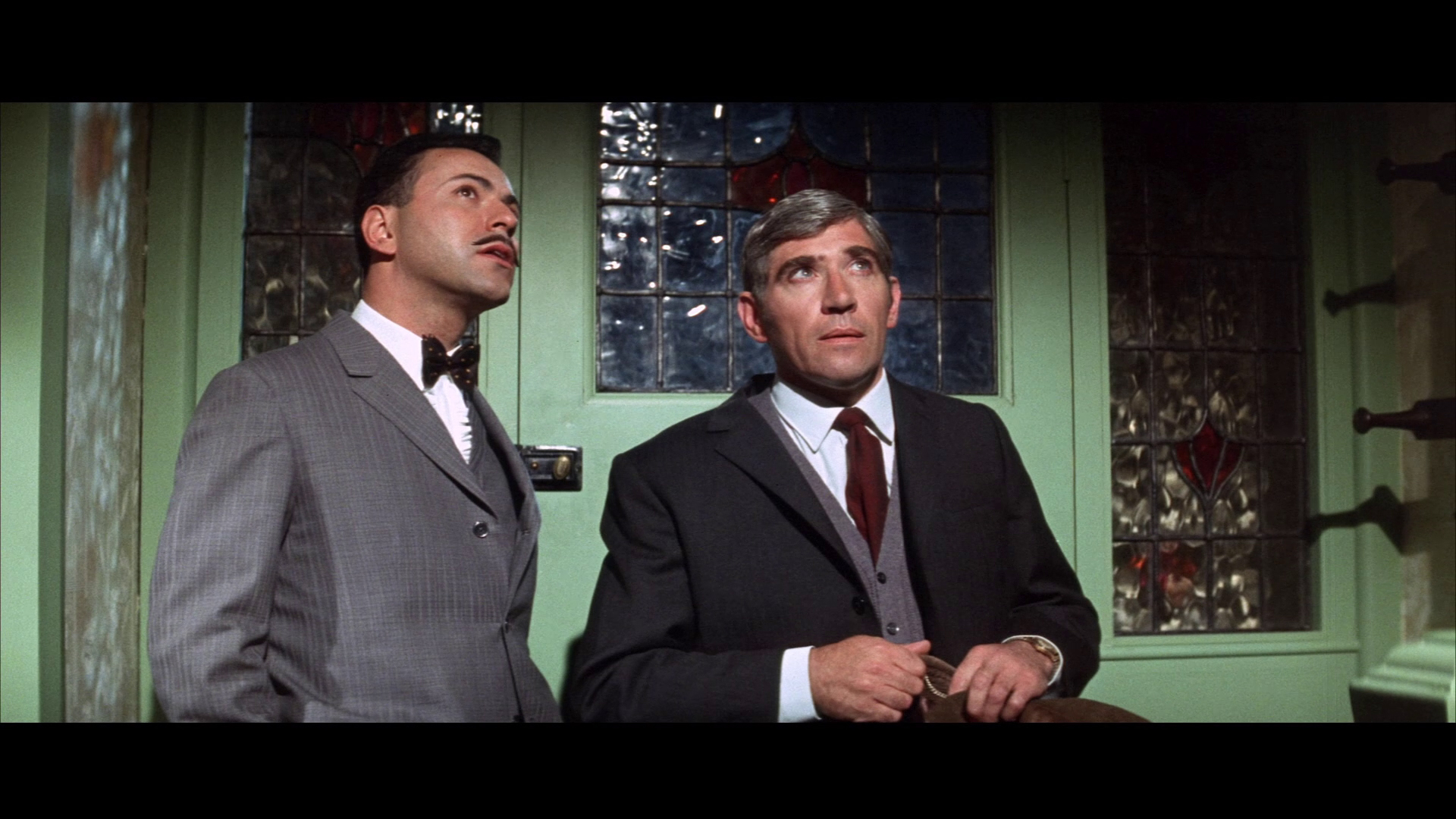 a completely different name; on its own terms the film is a fun and reasonably elegant caper film with a solid cast of British character actors and its share of funny gags, but the inevitable comparisons to the previous two films made it an uphill battle all the way that couldn't be won. The paper-thin plot involves a string of robberies committed in and around London, with Scotland Yard in the form of Superintendent Weaver (The Key and Lifeforce's Finlay) recruiting help in the form of Clouseau (Arkin). Unable to even exit his plane without disaster ensuing, Clouseau soon becomes ensnared in a plot involving hairdressers (including a pre-Frenzy Barry Foster), impersonators making lifelike rubber masks, a horny widow played by Psychomania's Beryl Reid, and potential romance with pretty Delia Boccardo (Tentacles). There's a definite attempt to emulate the Swinging London comedy tone that was popular at the time, especially with films by Richard Lester like The Knack... and How to Get It and Help!, and even his regular composer Ken Thorne chips in with the film's strongest asset, a very catchy and underrated score that's a highlight among a solid period that also found him working on The Touchables, The Bed Sitting Room, and The Magic Christian.
a completely different name; on its own terms the film is a fun and reasonably elegant caper film with a solid cast of British character actors and its share of funny gags, but the inevitable comparisons to the previous two films made it an uphill battle all the way that couldn't be won. The paper-thin plot involves a string of robberies committed in and around London, with Scotland Yard in the form of Superintendent Weaver (The Key and Lifeforce's Finlay) recruiting help in the form of Clouseau (Arkin). Unable to even exit his plane without disaster ensuing, Clouseau soon becomes ensnared in a plot involving hairdressers (including a pre-Frenzy Barry Foster), impersonators making lifelike rubber masks, a horny widow played by Psychomania's Beryl Reid, and potential romance with pretty Delia Boccardo (Tentacles). There's a definite attempt to emulate the Swinging London comedy tone that was popular at the time, especially with films by Richard Lester like The Knack... and How to Get It and Help!, and even his regular composer Ken Thorne chips in with the film's strongest asset, a very catchy and underrated score that's a highlight among a solid period that also found him working on The Touchables, The Bed Sitting Room, and The Magic Christian. 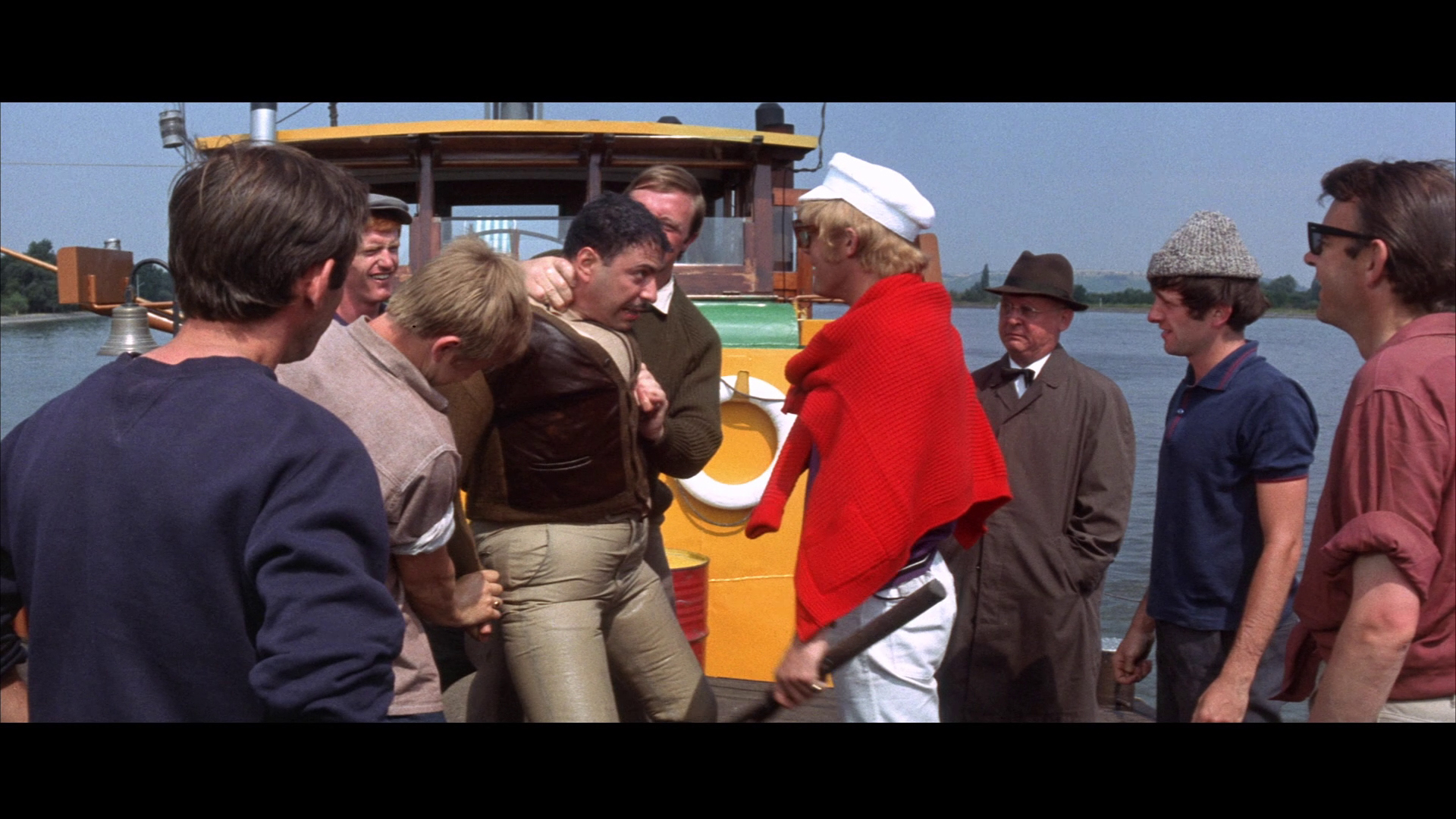 In short, if you're looking for a Peter Sellers-style collection of hijinks you'll probably come away disappointed, but if you love the strange, ambling, groovy tone of late '60s British cinema, there's plenty here to enjoy.
In short, if you're looking for a Peter Sellers-style collection of hijinks you'll probably come away disappointed, but if you love the strange, ambling, groovy tone of late '60s British cinema, there's plenty here to enjoy. 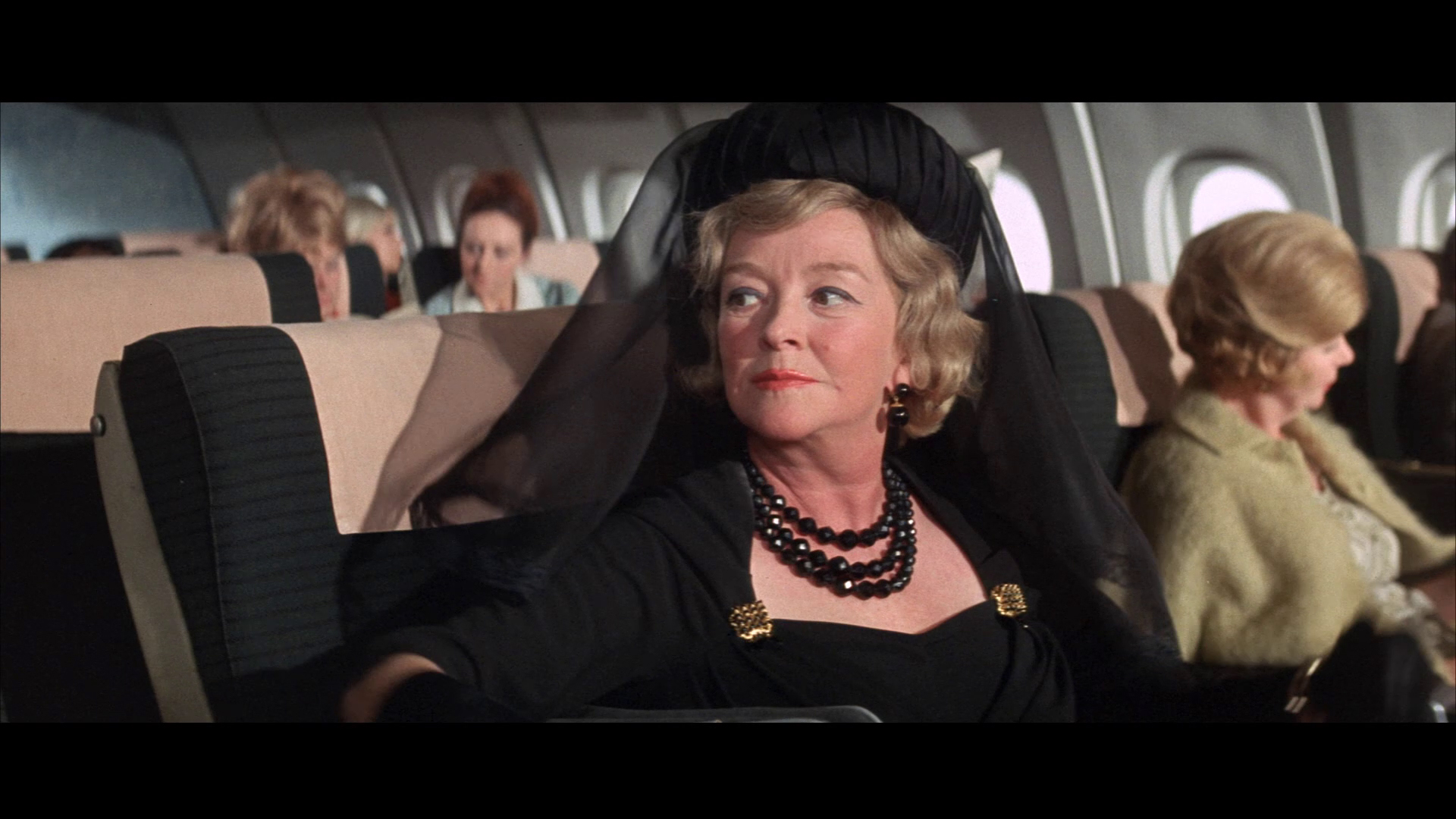
With Edwards' career on the ropes after a string of box office disappointments (and very underrated films) like The Wild Rovers, The Tamarind Seed, and Darling Lili, he and Sellers agreed to bring back their most famous character with 1975's The Return of the Pink Panther, which essentially kicked off an elaborate, multi-film study in world building that would bring together characters from the first two films for an ongoing narrative that would end up evolving for two decades. The agitated and oft-abused Inspector Dreyfus (Lom) and attack-ready manservant Cato (Kwouk) would be the biggest laugh getters throughout the cycle apart from Sellers, who would escalate the absurdity of his disguises and pratfalls to dizzying levels in The Pink Panther Strikes Again and The Revenge of the Pink Panther. Plans for another Clouseau film in 1980 were seemingly scrapped in 1980 when Sellers died of heart failure, leaving behind two drafts of a 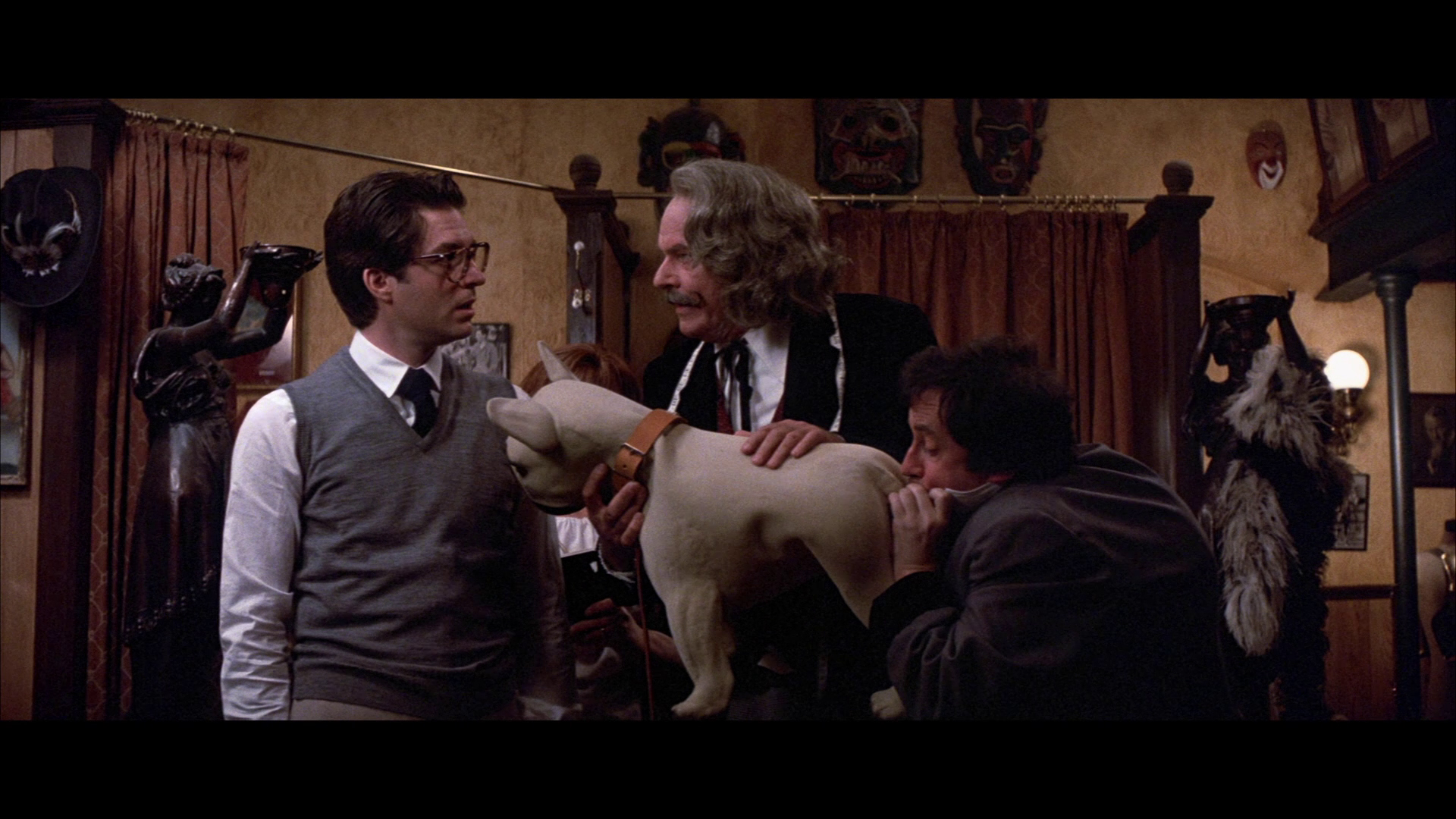 script he co-wrote called The Romance of the
script he co-wrote called The Romance of the 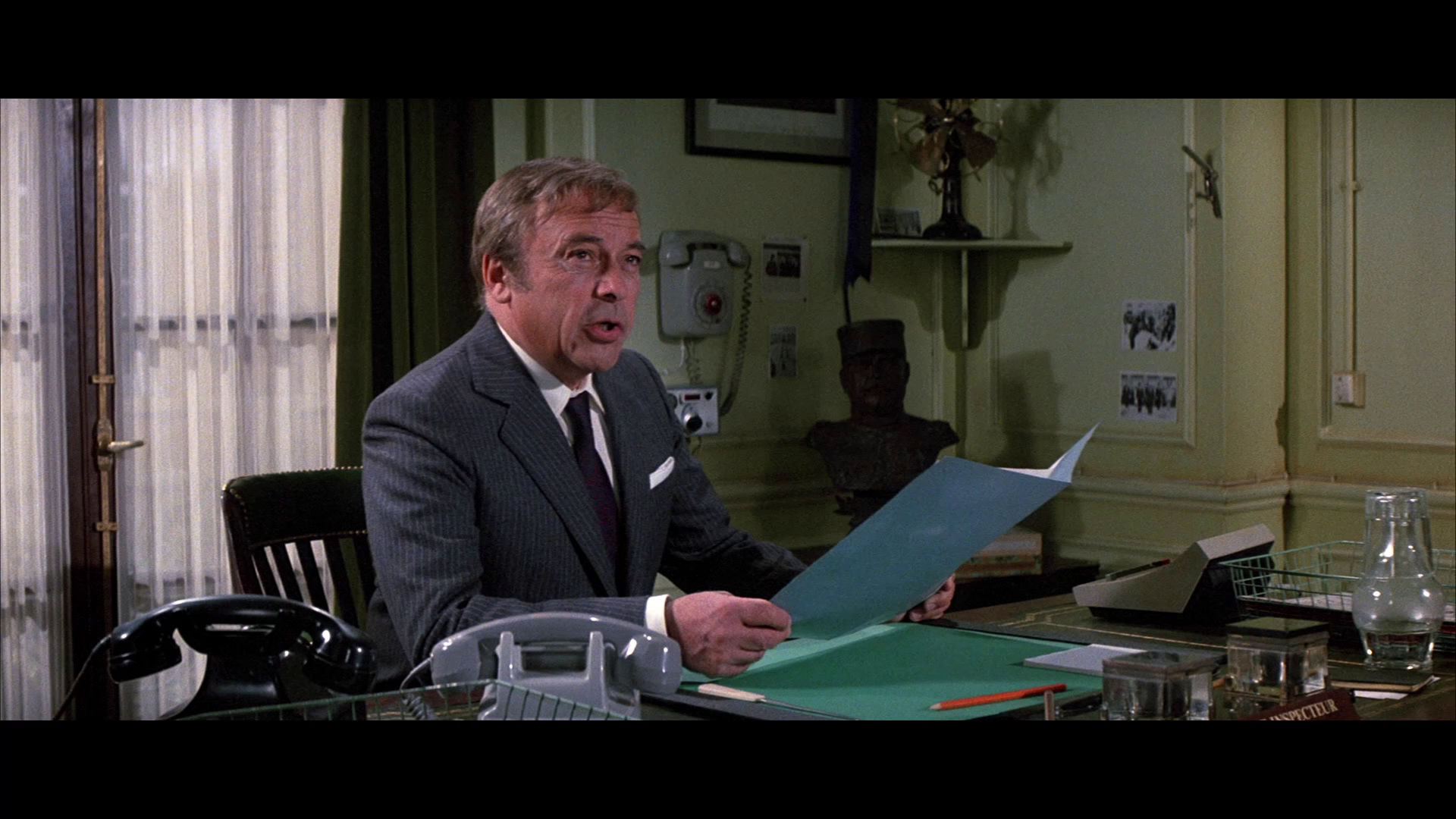 Pink Panther. Edwards came up with the idea of using copious outtakes from The Pink Panther Strikes Again to fashion a new story, a la Bruce Lee's Game of Death, in which the inspector goes missing after the first act thanks to another mystery involving the Pink Panther diamond. The cliffhanger ending found reporter Marie Jouveat (Lumley) pondering the fate of the great detective, who is hinted to be very much alive but seen only from behind staring at the sea (and being pooped on by a seagull).
Pink Panther. Edwards came up with the idea of using copious outtakes from The Pink Panther Strikes Again to fashion a new story, a la Bruce Lee's Game of Death, in which the inspector goes missing after the first act thanks to another mystery involving the Pink Panther diamond. The cliffhanger ending found reporter Marie Jouveat (Lumley) pondering the fate of the great detective, who is hinted to be very much alive but seen only from behind staring at the sea (and being pooped on by a seagull).
The creation of Trail of the Pink Panther necessitated an immediate sequel, which was shot back-to-back with Curse of the Pink Panther, featuring familiar series faces like David Niven (who had developed ALS and had to be dubbed not very convincingly by Rich Little), Capucine, and Robert Wagner joining Lom and Kwouk for one last outing together. This time the film tries to introduce a new bumbling sleuth at its core, American Sergeant Clifton Sleigh (Wass from TV's Soap and Blossom), who's chosen by a revolutionary new computer under Dreyfus' sabotaging watch to track down the revered Clouseau, whom the population at large still seems to believe is the world's greatest and cleverest detective. A visit to the disguise master Professor 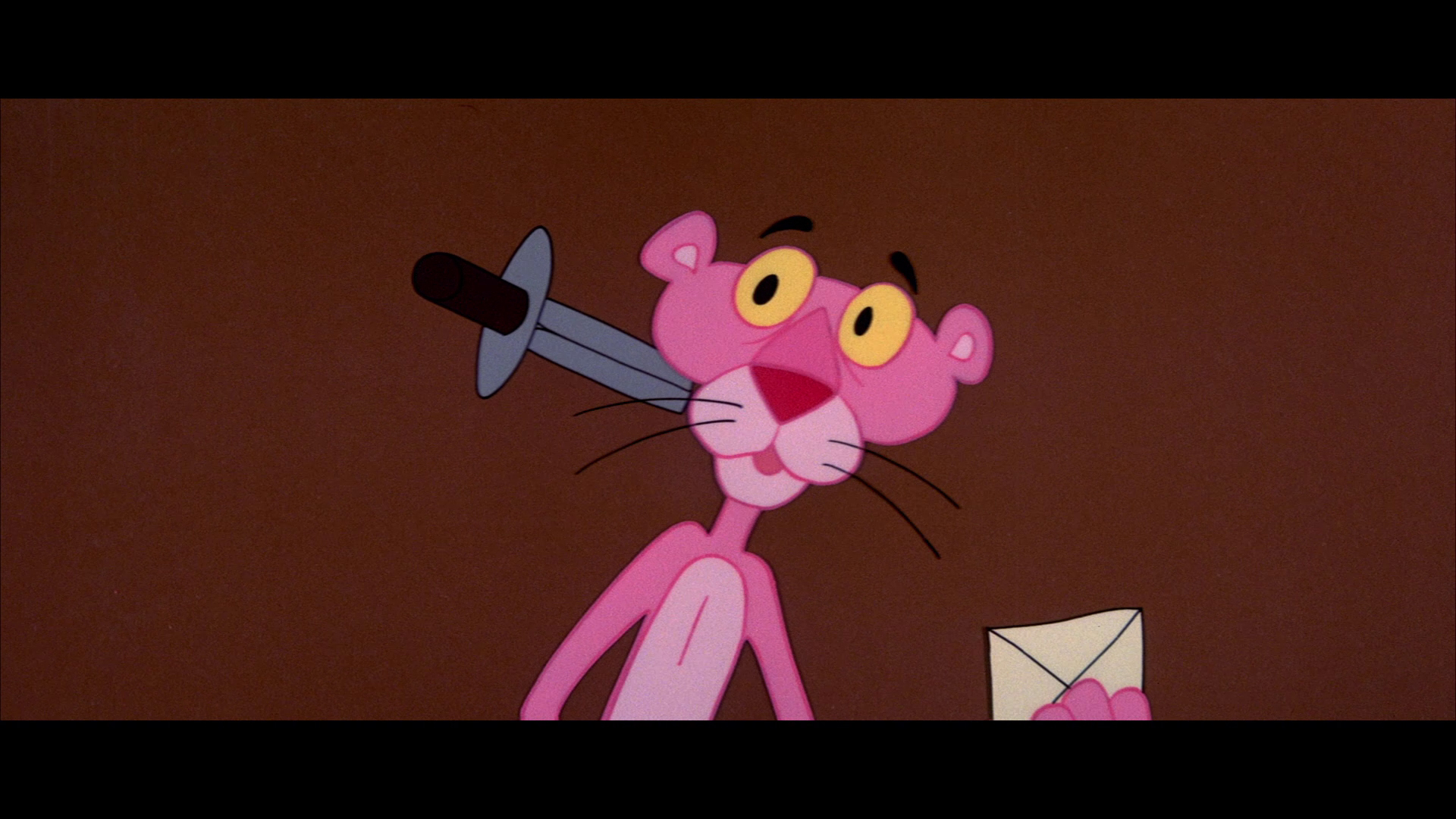 Balls (Korman) puts Sleigh on the hunt for Clouseau, whom everyone seems to want to stay hidden. When he isn't sending
Balls (Korman) puts Sleigh on the hunt for Clouseau, whom everyone seems to want to stay hidden. When he isn't sending 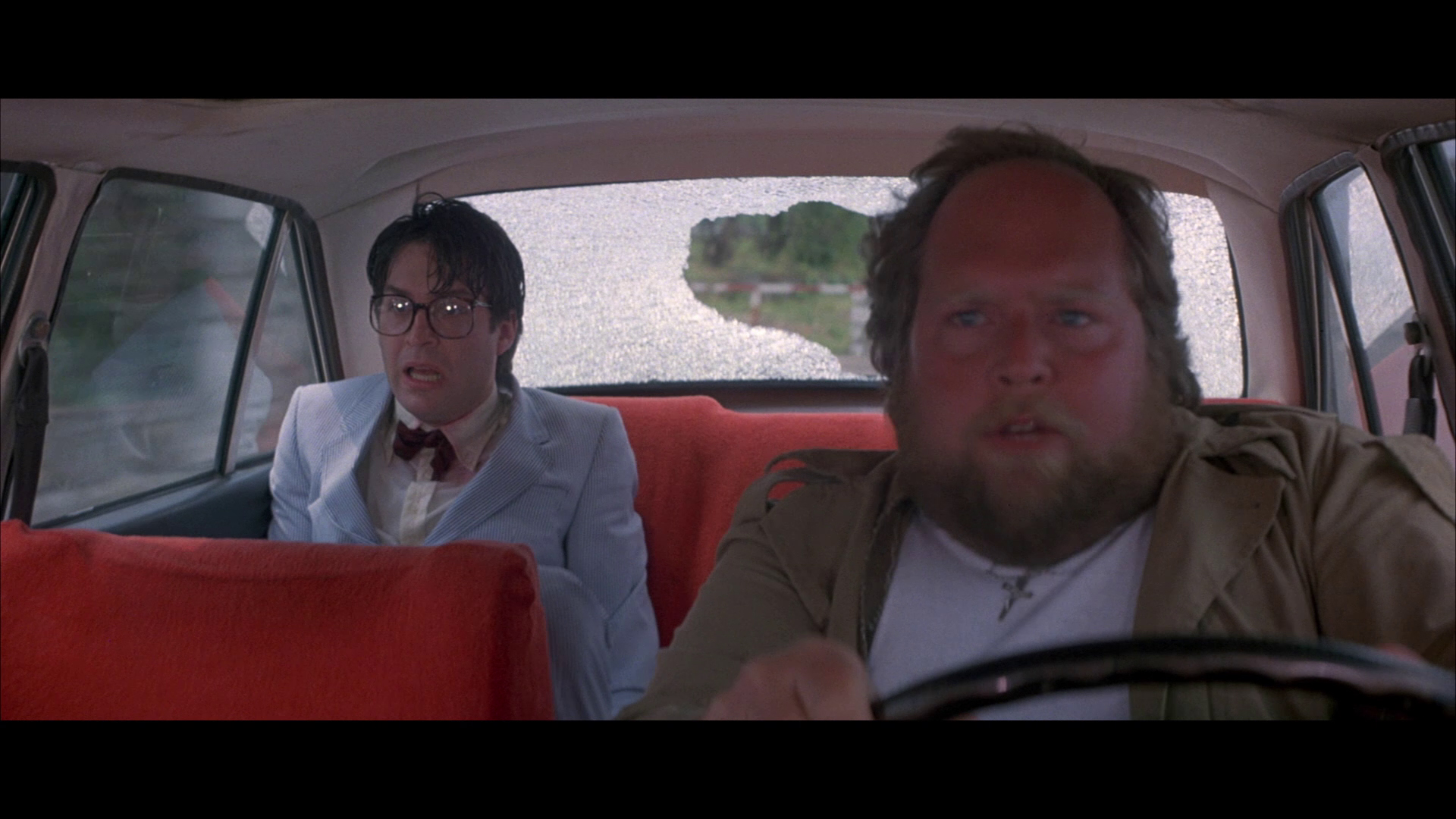 Dreyfus in and out of the hospital, Sleigh drifts through a gallery of characters including exotic health spa owner Countess Chandra (Lumley) and the married Sir Charles Lytton (Niven) and Simone (Capucine), as well as son George Lytton (Wagner), all of whom seem to have something to hide.
Dreyfus in and out of the hospital, Sleigh drifts through a gallery of characters including exotic health spa owner Countess Chandra (Lumley) and the married Sir Charles Lytton (Niven) and Simone (Capucine), as well as son George Lytton (Wagner), all of whom seem to have something to hide.
The obvious shortcoming here is Wass, whose generic aw-shucks American persona is an odd fit for the Panther canon and didn't launch a new series of films for obvious reasons. However, the film is more cohesive than its patchwork predecessor and manages to pay off in a spectacularly surreal and very funny reveal involving a certain famous celebrity from another major film series, who won't be revealed here. Edwards' affinity for clever scope framing is in abundance here with some striking hallucinatory visuals at times, especially the scenes involving the jewel heist and a splashy carnival sequence in Rio, and Henry Mancini contributes a pleasing jazz-inflected score that gives the film a nice sense of continuity 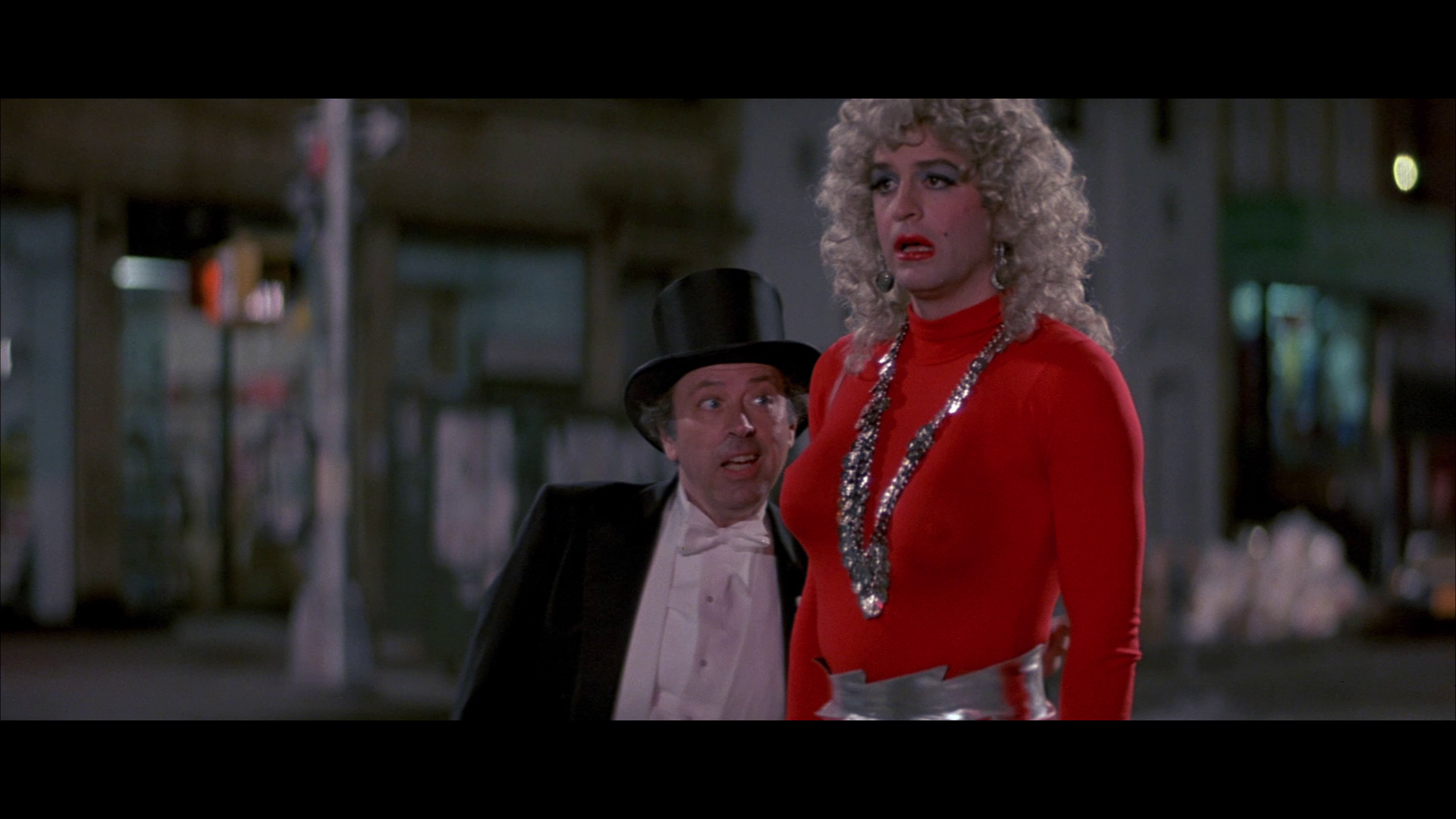 with the rest of the series. It's also a reflection of the somewhat sad-eyed philosophy that runs like a current through Edwards' films and
with the rest of the series. It's also a reflection of the somewhat sad-eyed philosophy that runs like a current through Edwards' films and 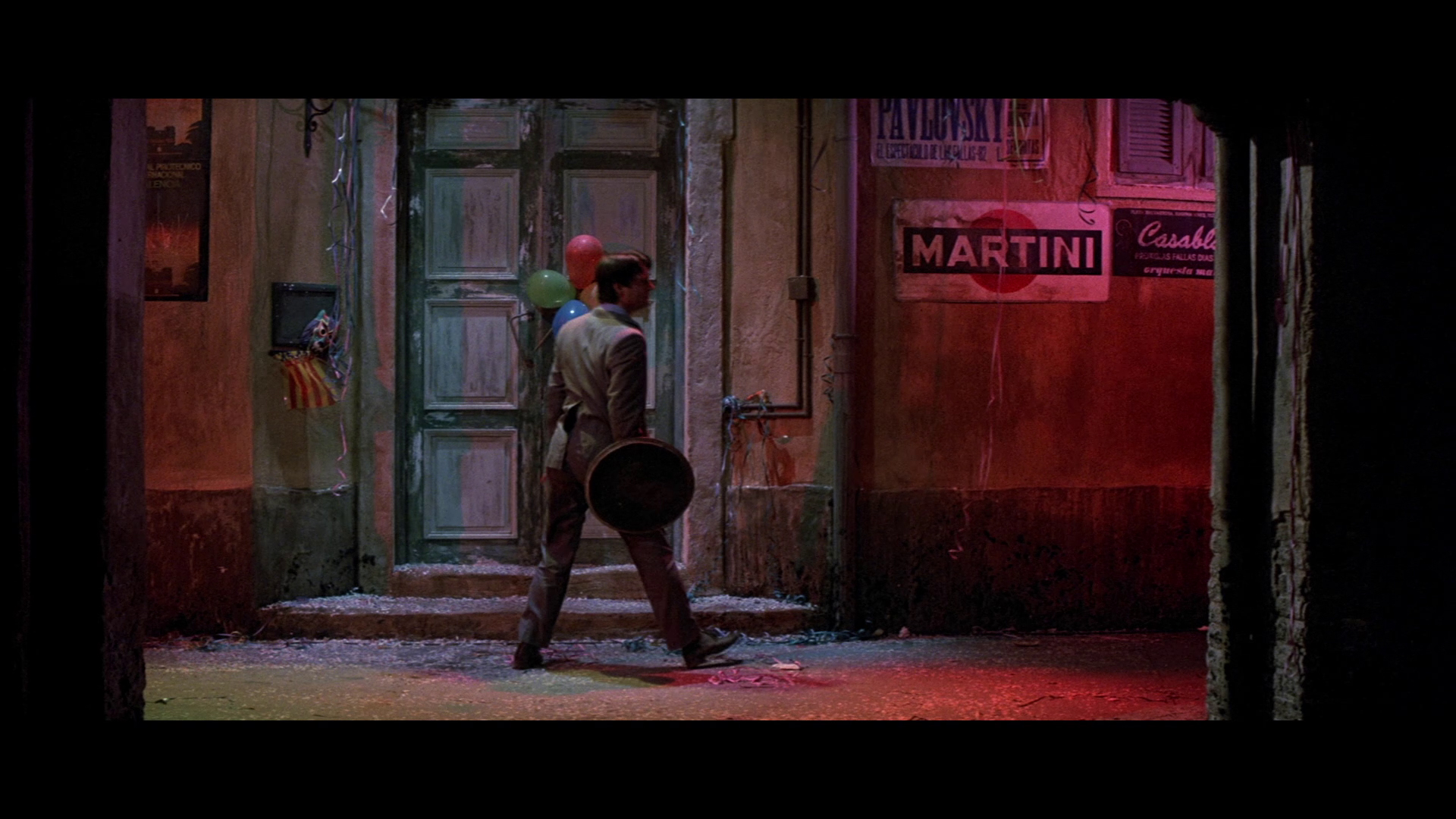 became impossible to ignore after S.O.B.; the message that no one is morally pure and everyone is destined to either cloister away or sail off into the horizon may be camouflaged with lots of silliness, but it's still undeniably there and perfectly in line with the often overlooked darker aspects of Edwards' comedies. Neither the best nor the worst in the series, it's an often elegant and amusing little trifle that could have sent the series off in reasonably high style.
became impossible to ignore after S.O.B.; the message that no one is morally pure and everyone is destined to either cloister away or sail off into the horizon may be camouflaged with lots of silliness, but it's still undeniably there and perfectly in line with the often overlooked darker aspects of Edwards' comedies. Neither the best nor the worst in the series, it's an often elegant and amusing little trifle that could have sent the series off in reasonably high style.
By this point it was fascinating how the Panther films reflected the evolution of Edwards' career from decade to decade, and it was only fitting that he would make two features in the 1990s before retiring from film (timed with the death of longtime composer Mancini, which makes sense) and having one last collaboration with Mancini for Broadway's Victor/Victoria. In what would prove to be his final feature film, Edwards took another stab at reviving the series with Son of the Pink Panther, which revolves around the conceit that Clouseau had secretly sired an illegitimate Italian 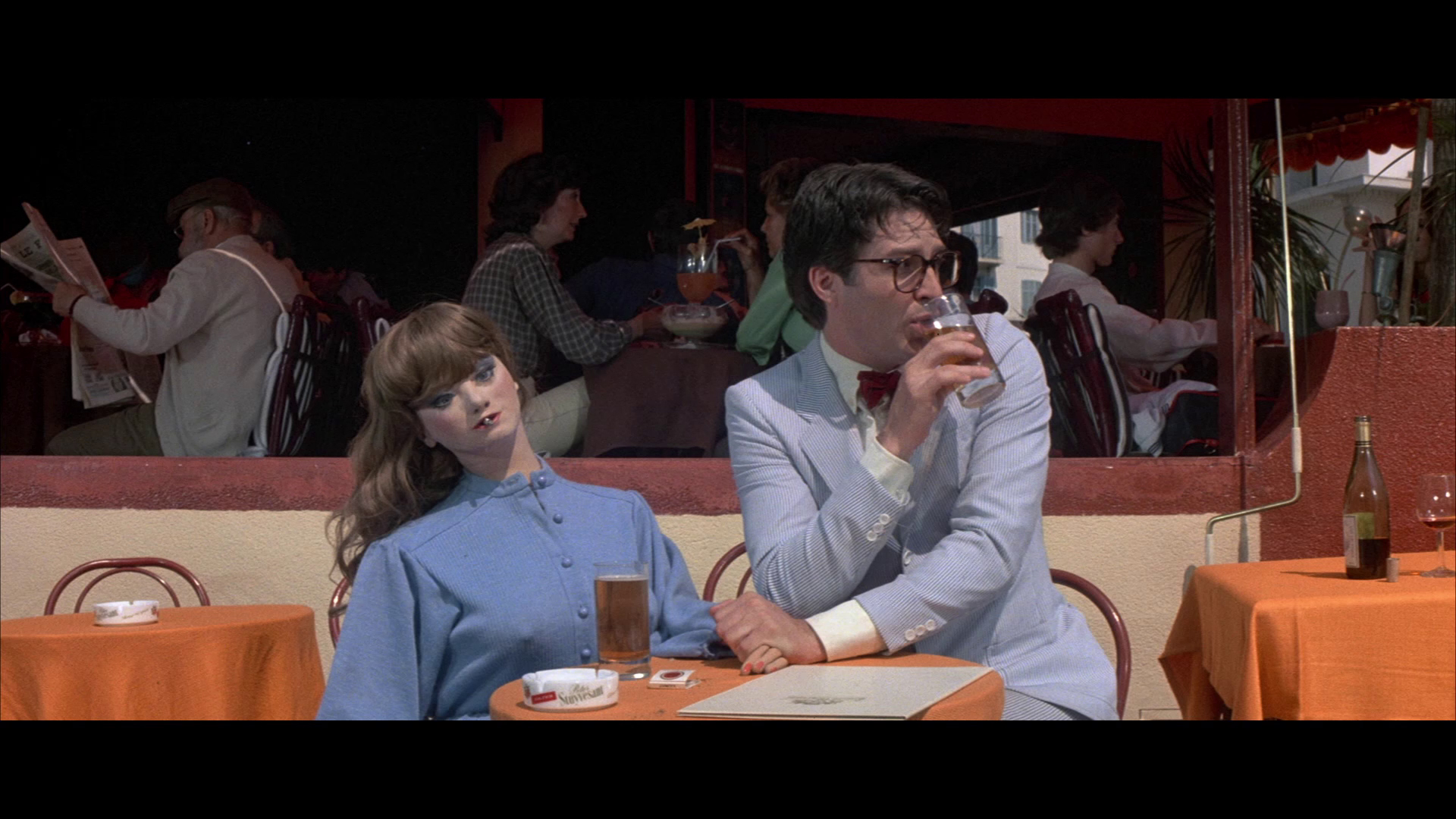 son with Maria Gambrelli, the sexy prime suspect from A Shot in the Dark played by Elke Sommer but here played by Claudia Cardinale, who was the princess in the original The Pink Panther. (Got all that?)
son with Maria Gambrelli, the sexy prime suspect from A Shot in the Dark played by Elke Sommer but here played by Claudia Cardinale, who was the princess in the original The Pink Panther. (Got all that?) 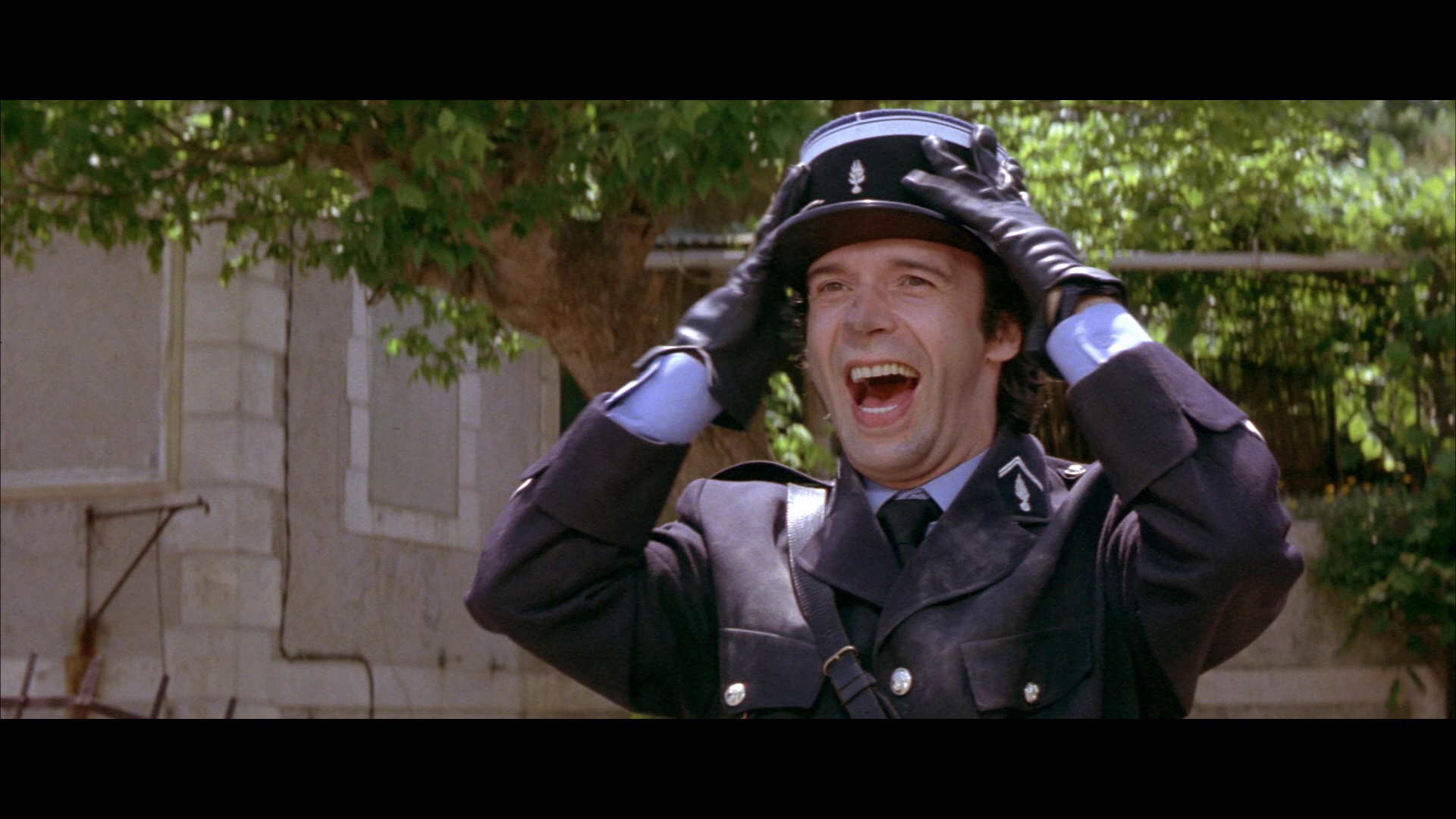
Things start off on an instantly outdated note with a vocalized version of the Pink Panther theme by Bobby McFerrin, and from there it feels like a Dalton-era Bond film with Licence to Kill's Robert Davi heading a terrorist organization determined to capture Princess Yasmin (Farentino) of Lugash in order to get her father to step aside for their own corrupt leader to take charge. The plan goes down off the coast of Nice, which means Dreyfus is in charge with solving the crime -- including a witness in the form of klutzy gendarme Jacques Gambrelli (Benigni). An injured Dreyfus and Maria Gambrelli reveal Jacques' true parentage as the only son of Clouseau, which inspires Jacques to leap into danger and solve the case as part of his family legacy.
Though it makes some attempt to keep in 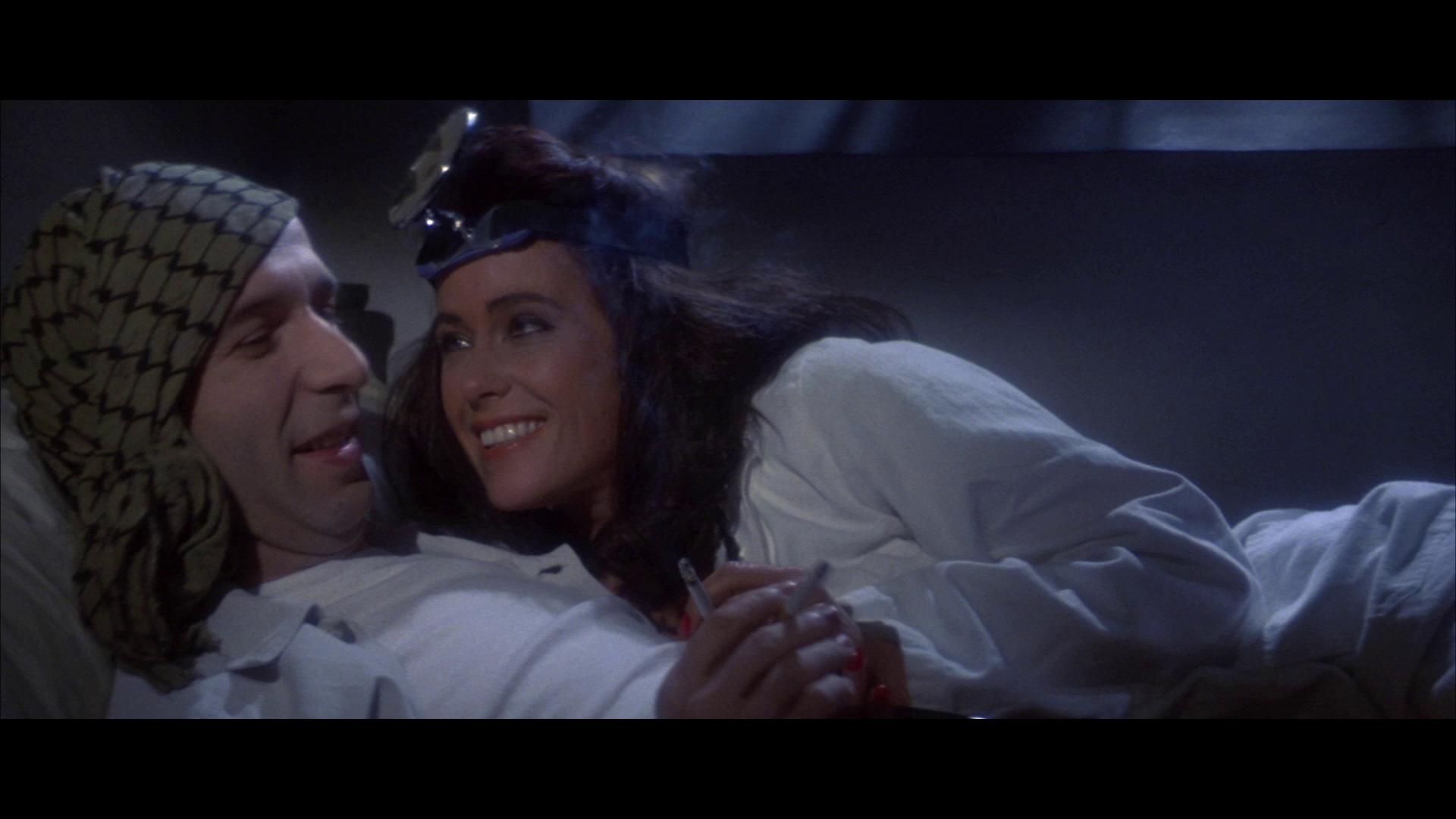 line with the series thanks to Lom and the inclusion of another incarnation of Professor Balls (Graham Stark this time, with a funny Liz Smith added to the mix as his bulbous-no0sed wife), Son of the Pink Panther feels like a completely different animal thanks to the manic, hammy presence of Benigni, who
line with the series thanks to Lom and the inclusion of another incarnation of Professor Balls (Graham Stark this time, with a funny Liz Smith added to the mix as his bulbous-no0sed wife), Son of the Pink Panther feels like a completely different animal thanks to the manic, hammy presence of Benigni, who 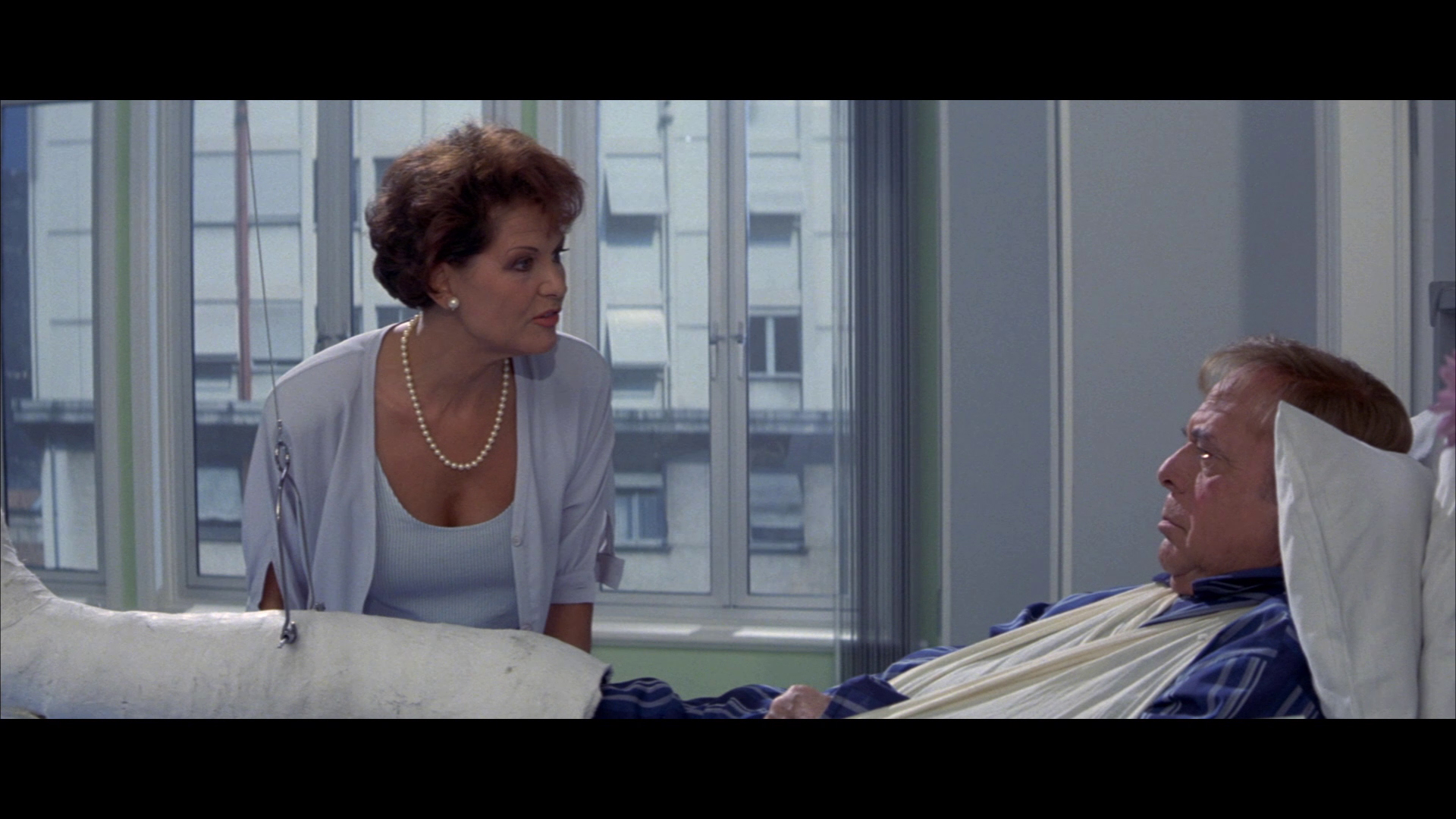 definitely isn't to all tastes. Already a fixture in Jim Jarmusch films and a future double Oscar winner for Life Is Beautiful, Benigni is a tricky force to harness for other directors; Edwards makes the right call by emphasizing his prowess for physical comedy, though the attempted catch phrase "That felt good!" doesn't work at all. It's no secret that a lot of '90s film stock had a rather drab, artificial look to it, and that's the case here as the punchy colors of past Panther films get turned into earth tones and pastels instead with the Panavision compositions getting much more claustrophobic in the process. It's a real odd duck of a film (and an unusually short one, relatively speaking), but not one without interest as a swan song for both Edwards and his most famous film series. (And it's still miles better than the two Steve Martin films.)
definitely isn't to all tastes. Already a fixture in Jim Jarmusch films and a future double Oscar winner for Life Is Beautiful, Benigni is a tricky force to harness for other directors; Edwards makes the right call by emphasizing his prowess for physical comedy, though the attempted catch phrase "That felt good!" doesn't work at all. It's no secret that a lot of '90s film stock had a rather drab, artificial look to it, and that's the case here as the punchy colors of past Panther films get turned into earth tones and pastels instead with the Panavision compositions getting much more claustrophobic in the process. It's a real odd duck of a film (and an unusually short one, relatively speaking), but not one without interest as a swan song for both Edwards and his most famous film series. (And it's still miles better than the two Steve Martin films.)
Apart from an early release for the first film, it took an insane amount of time for the Clouseau movies to come to Blu-ray despite its long-running popularity on every prior home video format (including individual DVD releases 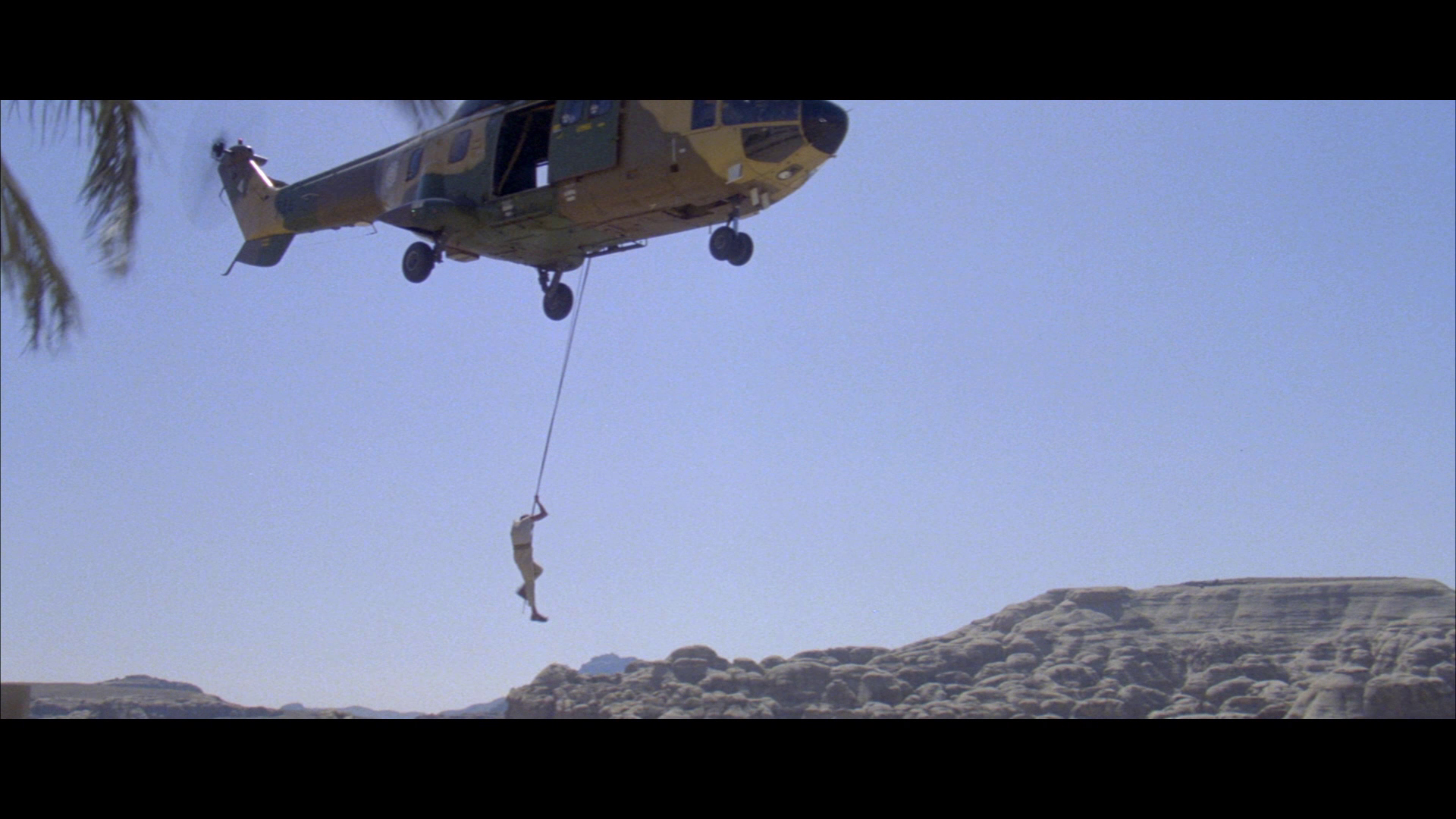 and various boxed sets). The summer of 2017 corrected that problem with a vengeance as every single Clouseau film from United Artists hit Blu-ray at the
and various boxed sets). The summer of 2017 corrected that problem with a vengeance as every single Clouseau film from United Artists hit Blu-ray at the 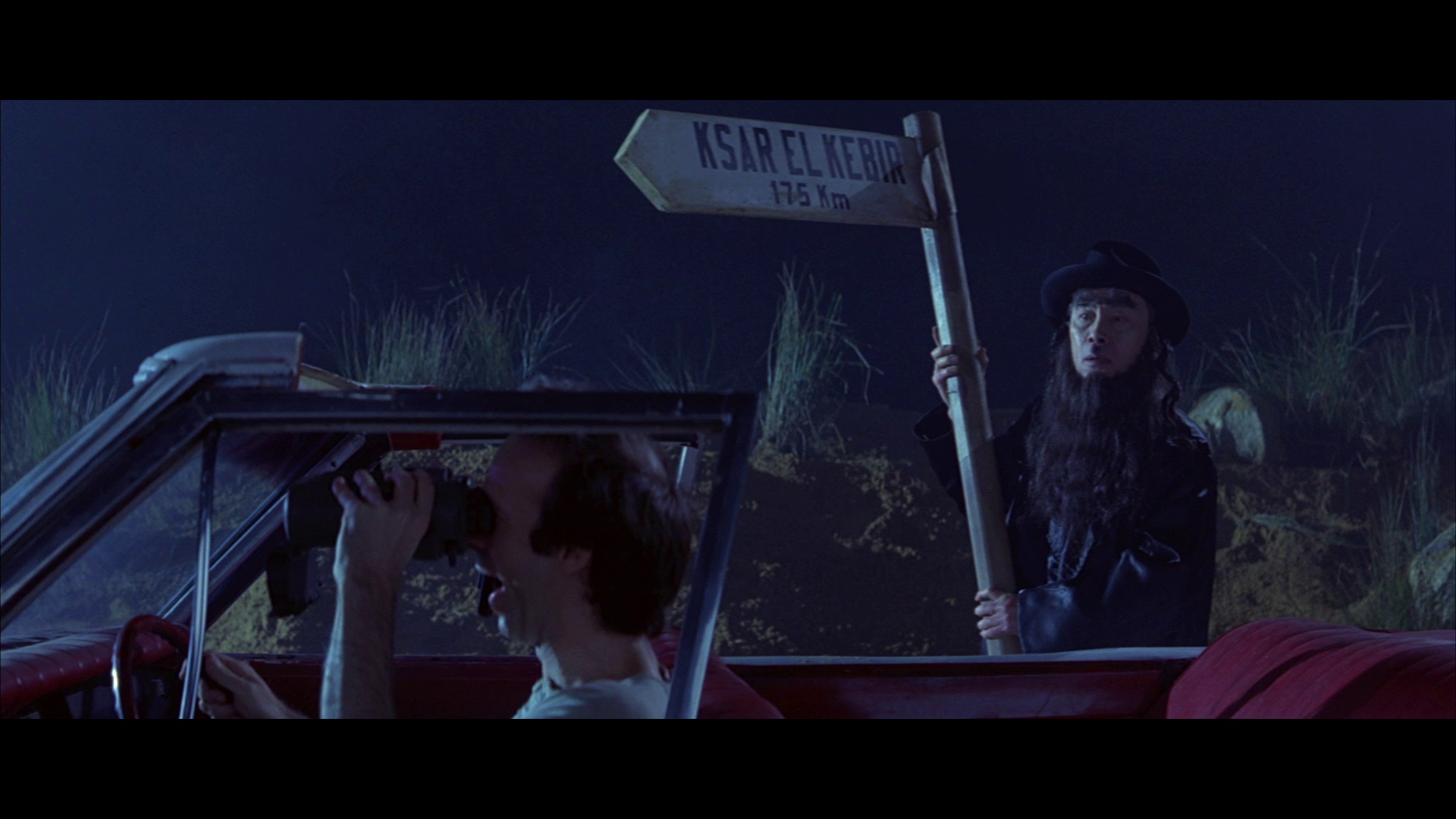 same time, with the Sellers films getting a Shout! Factory set and the remaining three coming out separately on Blu-ray from Kino Lorber. All three feature fairly recent HD transfers from MGM that have popped up on MGM HD in the last year but look better here with more robust bit rates and without the broadcast-friendly noise reduction the channel usually applies. The first two films show some softness and generational loss during the animated opening credits due to the opticals involved (especially Inspector Clouseau), but the body of each film looks very solid with accurate framing and bold colors (where applicable) and only minimal signs of wear. The DTS-HD MA English audio tracks sound excellent, with the 2.0 stereo track for Son faring the best due to advances in sound recording at that point.
same time, with the Sellers films getting a Shout! Factory set and the remaining three coming out separately on Blu-ray from Kino Lorber. All three feature fairly recent HD transfers from MGM that have popped up on MGM HD in the last year but look better here with more robust bit rates and without the broadcast-friendly noise reduction the channel usually applies. The first two films show some softness and generational loss during the animated opening credits due to the opticals involved (especially Inspector Clouseau), but the body of each film looks very solid with accurate framing and bold colors (where applicable) and only minimal signs of wear. The DTS-HD MA English audio tracks sound excellent, with the 2.0 stereo track for Son faring the best due to advances in sound recording at that point.
As for extras, Inspector Clouseau comes with a new audio commentary by William Patrick Maynard, plus the theatrical trailer and bonus ones for The Russians Are Coming, The Russians Are Coming, After the Fox, and Curse and Son. Maynard doesn't try to sugarcoat the shortcomings of the film, noting the lack of chemistry between the director and star and exploring the questionable decisions that led to its 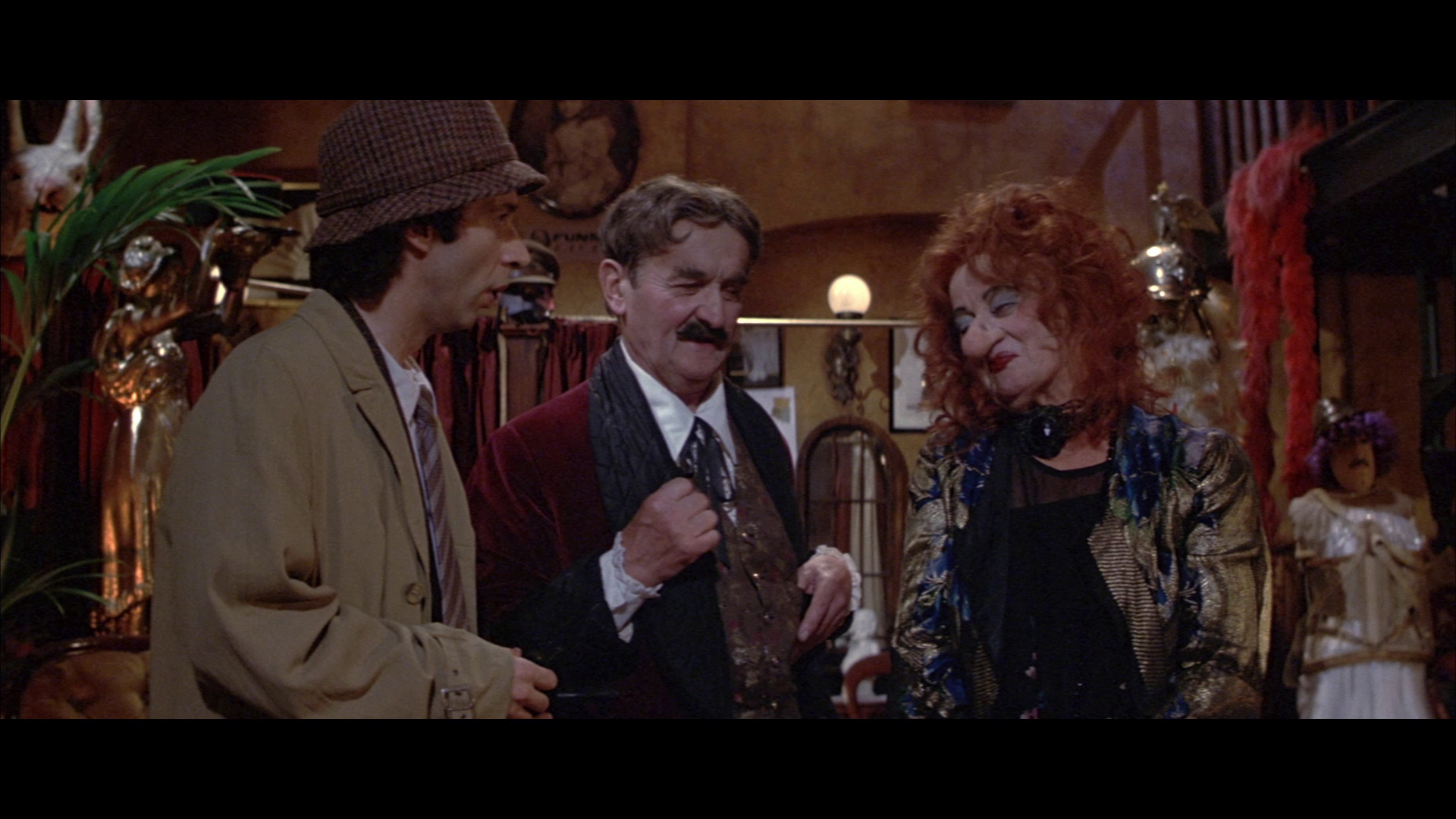 outlier status, but he points out its merits as well and does a fine albeit low-key job of explaining how this both ties in with and radically breaks from the
outlier status, but he points out its merits as well and does a fine albeit low-key job of explaining how this both ties in with and radically breaks from the 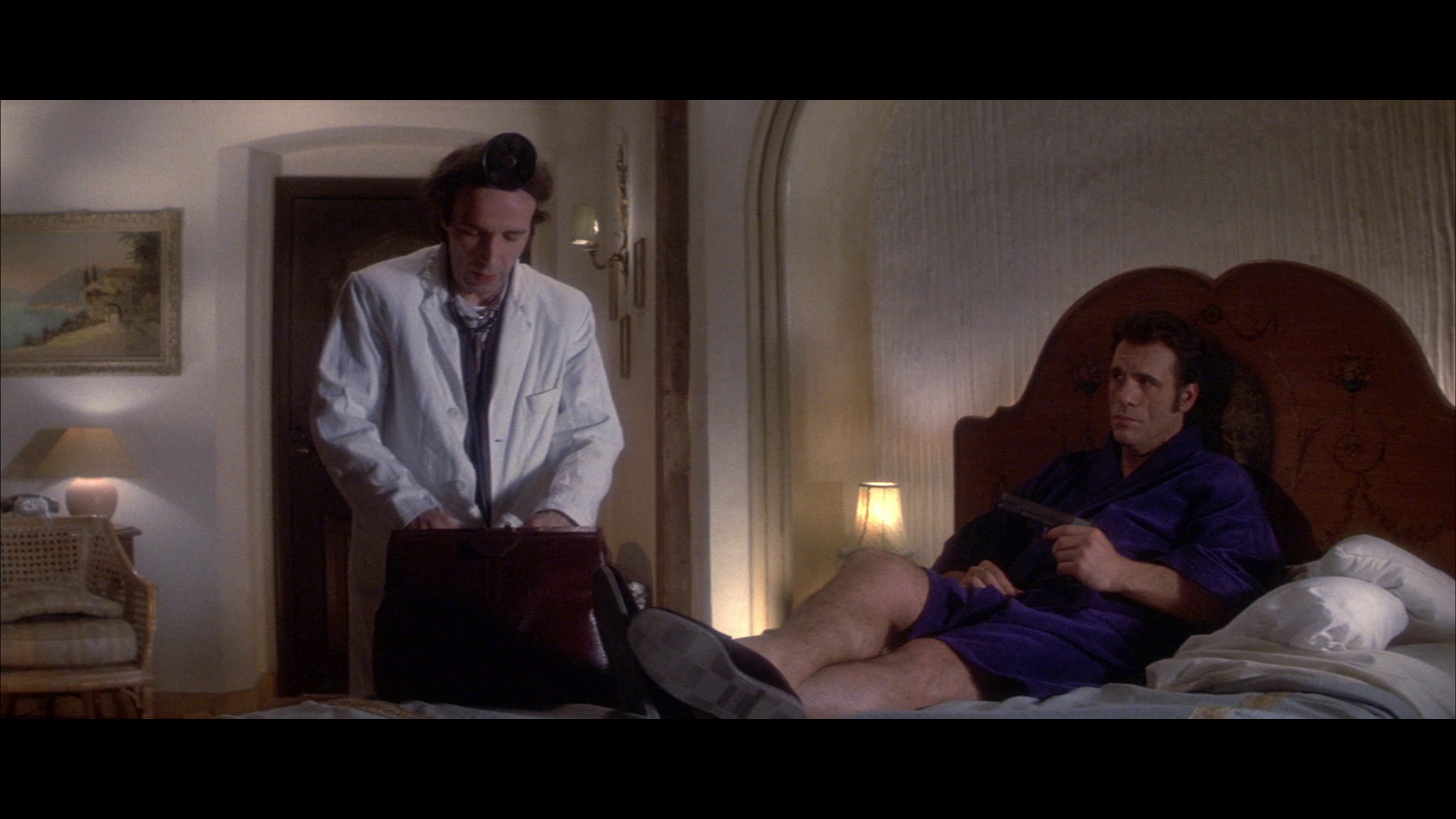 rest of the Panther saga. Curse of the Pink Panther features a video interview with Wass (16m50s) about his early acting days and his hiring process for this film, which led to script pages behind faxed in bunches before he could really go into the role with Edwards, whom he eventually met before the shoot by having a benihana dinner at the director's home with wife Julie Andrews. Son of the Pink Panther boasts a terrific new audio commentary by The Peter Sellers Appreciation Society's Jason Simos, who really knows his stuff as he points out all the little aspects that make this film a singular one in the series (starting with its status as the only one with no pre-credits scene and noting the weirdness of the Dreyfus and Gambrelli characters acting like they'd never met before) and noting all of the little Edwards touches, such as casting his daughter Jennifer as a "bad-ass villainess." (Incredibly, he also mentions some other casting considerations for the lead including Kevin Kline, Tim Robbins, and Gerard Depardieu. Try to picture that.) Also included are a vintage making-of EPK featurette (7m6s) in very choppy quality, two short deleted scenes from the Italian-dubbed version, and an alternate extended Son trailer. Also included on Curse and Son are theatrical trailers for all eight Edwards/Panther titles.
rest of the Panther saga. Curse of the Pink Panther features a video interview with Wass (16m50s) about his early acting days and his hiring process for this film, which led to script pages behind faxed in bunches before he could really go into the role with Edwards, whom he eventually met before the shoot by having a benihana dinner at the director's home with wife Julie Andrews. Son of the Pink Panther boasts a terrific new audio commentary by The Peter Sellers Appreciation Society's Jason Simos, who really knows his stuff as he points out all the little aspects that make this film a singular one in the series (starting with its status as the only one with no pre-credits scene and noting the weirdness of the Dreyfus and Gambrelli characters acting like they'd never met before) and noting all of the little Edwards touches, such as casting his daughter Jennifer as a "bad-ass villainess." (Incredibly, he also mentions some other casting considerations for the lead including Kevin Kline, Tim Robbins, and Gerard Depardieu. Try to picture that.) Also included are a vintage making-of EPK featurette (7m6s) in very choppy quality, two short deleted scenes from the Italian-dubbed version, and an alternate extended Son trailer. Also included on Curse and Son are theatrical trailers for all eight Edwards/Panther titles.
Reviewed on June 22, 2017.



 Though it wasn't exactly intended as a long-running film series in the beginning, no run of movie comedies has held quite the same place in viewers' hearts as the slapstick adventures of Inspector Clouseau that began with a glossy widescreen European heist film called The Pink Panther in 1963. Part of a streak of genre-hopping hits by Blake Edwards commenced with Breakfast at Tiffany's in 1961, it was intended as a star vehicle for David Niven and Robert Wagner with Peter Sellers cast as the clumsy, heavily accented French inspector involved the pilfering of the valuable titular diamond. Of course Sellers stole the entire film and earned a second film all to himself, A Shot in the Dark, written by The Exorcist's William Peter Blatty with Edwards at the helm again. That seemed to be it for the director and star, who expressed no interest to team up for a third outing despite the desires of The Mirisch Company and United Artists to keep it going, especially with the animated Pink Panther and Inspector shorts inspired by the films' iconic credit sequences still going strong.
Though it wasn't exactly intended as a long-running film series in the beginning, no run of movie comedies has held quite the same place in viewers' hearts as the slapstick adventures of Inspector Clouseau that began with a glossy widescreen European heist film called The Pink Panther in 1963. Part of a streak of genre-hopping hits by Blake Edwards commenced with Breakfast at Tiffany's in 1961, it was intended as a star vehicle for David Niven and Robert Wagner with Peter Sellers cast as the clumsy, heavily accented French inspector involved the pilfering of the valuable titular diamond. Of course Sellers stole the entire film and earned a second film all to himself, A Shot in the Dark, written by The Exorcist's William Peter Blatty with Edwards at the helm again. That seemed to be it for the director and star, who expressed no interest to team up for a third outing despite the desires of The Mirisch Company and United Artists to keep it going, especially with the animated Pink Panther and Inspector shorts inspired by the films' iconic credit sequences still going strong.  temperamental than Sellers' interpretation, Arkin would have probably been better received had he been playing a character with
temperamental than Sellers' interpretation, Arkin would have probably been better received had he been playing a character with  a completely different name; on its own terms the film is a fun and reasonably elegant caper film with a solid cast of British character actors and its share of funny gags, but the inevitable comparisons to the previous two films made it an uphill battle all the way that couldn't be won. The paper-thin plot involves a string of robberies committed in and around London, with Scotland Yard in the form of Superintendent Weaver (The Key and Lifeforce's Finlay) recruiting help in the form of Clouseau (Arkin). Unable to even exit his plane without disaster ensuing, Clouseau soon becomes ensnared in a plot involving hairdressers (including a pre-Frenzy Barry Foster), impersonators making lifelike rubber masks, a horny widow played by Psychomania's Beryl Reid, and potential romance with pretty Delia Boccardo (Tentacles). There's a definite attempt to emulate the Swinging London comedy tone that was popular at the time, especially with films by Richard Lester like The Knack... and How to Get It and Help!, and even his regular composer Ken Thorne chips in with the film's strongest asset, a very catchy and underrated score that's a highlight among a solid period that also found him working on The Touchables, The Bed Sitting Room, and The Magic Christian.
a completely different name; on its own terms the film is a fun and reasonably elegant caper film with a solid cast of British character actors and its share of funny gags, but the inevitable comparisons to the previous two films made it an uphill battle all the way that couldn't be won. The paper-thin plot involves a string of robberies committed in and around London, with Scotland Yard in the form of Superintendent Weaver (The Key and Lifeforce's Finlay) recruiting help in the form of Clouseau (Arkin). Unable to even exit his plane without disaster ensuing, Clouseau soon becomes ensnared in a plot involving hairdressers (including a pre-Frenzy Barry Foster), impersonators making lifelike rubber masks, a horny widow played by Psychomania's Beryl Reid, and potential romance with pretty Delia Boccardo (Tentacles). There's a definite attempt to emulate the Swinging London comedy tone that was popular at the time, especially with films by Richard Lester like The Knack... and How to Get It and Help!, and even his regular composer Ken Thorne chips in with the film's strongest asset, a very catchy and underrated score that's a highlight among a solid period that also found him working on The Touchables, The Bed Sitting Room, and The Magic Christian.  In short, if you're looking for a Peter Sellers-style collection of hijinks you'll probably come away disappointed, but if you love the strange, ambling, groovy tone of late '60s British cinema, there's plenty here to enjoy.
In short, if you're looking for a Peter Sellers-style collection of hijinks you'll probably come away disappointed, but if you love the strange, ambling, groovy tone of late '60s British cinema, there's plenty here to enjoy. 
 script he co-wrote called The Romance of the
script he co-wrote called The Romance of the  Pink Panther. Edwards came up with the idea of using copious outtakes from The Pink Panther Strikes Again to fashion a new story, a la Bruce Lee's Game of Death, in which the inspector goes missing after the first act thanks to another mystery involving the Pink Panther diamond. The cliffhanger ending found reporter Marie Jouveat (Lumley) pondering the fate of the great detective, who is hinted to be very much alive but seen only from behind staring at the sea (and being pooped on by a seagull).
Pink Panther. Edwards came up with the idea of using copious outtakes from The Pink Panther Strikes Again to fashion a new story, a la Bruce Lee's Game of Death, in which the inspector goes missing after the first act thanks to another mystery involving the Pink Panther diamond. The cliffhanger ending found reporter Marie Jouveat (Lumley) pondering the fate of the great detective, who is hinted to be very much alive but seen only from behind staring at the sea (and being pooped on by a seagull).  Balls (Korman) puts Sleigh on the hunt for Clouseau, whom everyone seems to want to stay hidden. When he isn't sending
Balls (Korman) puts Sleigh on the hunt for Clouseau, whom everyone seems to want to stay hidden. When he isn't sending  Dreyfus in and out of the hospital, Sleigh drifts through a gallery of characters including exotic health spa owner Countess Chandra (Lumley) and the married Sir Charles Lytton (Niven) and Simone (Capucine), as well as son George Lytton (Wagner), all of whom seem to have something to hide.
Dreyfus in and out of the hospital, Sleigh drifts through a gallery of characters including exotic health spa owner Countess Chandra (Lumley) and the married Sir Charles Lytton (Niven) and Simone (Capucine), as well as son George Lytton (Wagner), all of whom seem to have something to hide.  with the rest of the series. It's also a reflection of the somewhat sad-eyed philosophy that runs like a current through Edwards' films and
with the rest of the series. It's also a reflection of the somewhat sad-eyed philosophy that runs like a current through Edwards' films and  became impossible to ignore after S.O.B.; the message that no one is morally pure and everyone is destined to either cloister away or sail off into the horizon may be camouflaged with lots of silliness, but it's still undeniably there and perfectly in line with the often overlooked darker aspects of Edwards' comedies. Neither the best nor the worst in the series, it's an often elegant and amusing little trifle that could have sent the series off in reasonably high style.
became impossible to ignore after S.O.B.; the message that no one is morally pure and everyone is destined to either cloister away or sail off into the horizon may be camouflaged with lots of silliness, but it's still undeniably there and perfectly in line with the often overlooked darker aspects of Edwards' comedies. Neither the best nor the worst in the series, it's an often elegant and amusing little trifle that could have sent the series off in reasonably high style.  son with Maria Gambrelli, the sexy prime suspect from A Shot in the Dark played by Elke Sommer but here played by Claudia Cardinale, who was the princess in the original The Pink Panther. (Got all that?)
son with Maria Gambrelli, the sexy prime suspect from A Shot in the Dark played by Elke Sommer but here played by Claudia Cardinale, who was the princess in the original The Pink Panther. (Got all that?) 
 line with the series thanks to Lom and the inclusion of another incarnation of Professor Balls (Graham Stark this time, with a funny Liz Smith added to the mix as his bulbous-no0sed wife), Son of the Pink Panther feels like a completely different animal thanks to the manic, hammy presence of Benigni, who
line with the series thanks to Lom and the inclusion of another incarnation of Professor Balls (Graham Stark this time, with a funny Liz Smith added to the mix as his bulbous-no0sed wife), Son of the Pink Panther feels like a completely different animal thanks to the manic, hammy presence of Benigni, who  definitely isn't to all tastes. Already a fixture in Jim Jarmusch films and a future double Oscar winner for Life Is Beautiful, Benigni is a tricky force to harness for other directors; Edwards makes the right call by emphasizing his prowess for physical comedy, though the attempted catch phrase "That felt good!" doesn't work at all. It's no secret that a lot of '90s film stock had a rather drab, artificial look to it, and that's the case here as the punchy colors of past Panther films get turned into earth tones and pastels instead with the Panavision compositions getting much more claustrophobic in the process. It's a real odd duck of a film (and an unusually short one, relatively speaking), but not one without interest as a swan song for both Edwards and his most famous film series. (And it's still miles better than the two Steve Martin films.)
definitely isn't to all tastes. Already a fixture in Jim Jarmusch films and a future double Oscar winner for Life Is Beautiful, Benigni is a tricky force to harness for other directors; Edwards makes the right call by emphasizing his prowess for physical comedy, though the attempted catch phrase "That felt good!" doesn't work at all. It's no secret that a lot of '90s film stock had a rather drab, artificial look to it, and that's the case here as the punchy colors of past Panther films get turned into earth tones and pastels instead with the Panavision compositions getting much more claustrophobic in the process. It's a real odd duck of a film (and an unusually short one, relatively speaking), but not one without interest as a swan song for both Edwards and his most famous film series. (And it's still miles better than the two Steve Martin films.)  and various boxed sets). The summer of 2017 corrected that problem with a vengeance as every single Clouseau film from United Artists hit Blu-ray at the
and various boxed sets). The summer of 2017 corrected that problem with a vengeance as every single Clouseau film from United Artists hit Blu-ray at the  same time, with the Sellers films getting a Shout! Factory set and the remaining three coming out separately on Blu-ray from Kino Lorber. All three feature fairly recent HD transfers from MGM that have popped up on MGM HD in the last year but look better here with more robust bit rates and without the broadcast-friendly noise reduction the channel usually applies. The first two films show some softness and generational loss during the animated opening credits due to the opticals involved (especially Inspector Clouseau), but the body of each film looks very solid with accurate framing and bold colors (where applicable) and only minimal signs of wear. The DTS-HD MA English audio tracks sound excellent, with the 2.0 stereo track for Son faring the best due to advances in sound recording at that point.
same time, with the Sellers films getting a Shout! Factory set and the remaining three coming out separately on Blu-ray from Kino Lorber. All three feature fairly recent HD transfers from MGM that have popped up on MGM HD in the last year but look better here with more robust bit rates and without the broadcast-friendly noise reduction the channel usually applies. The first two films show some softness and generational loss during the animated opening credits due to the opticals involved (especially Inspector Clouseau), but the body of each film looks very solid with accurate framing and bold colors (where applicable) and only minimal signs of wear. The DTS-HD MA English audio tracks sound excellent, with the 2.0 stereo track for Son faring the best due to advances in sound recording at that point.  outlier status, but he points out its merits as well and does a fine albeit low-key job of explaining how this both ties in with and radically breaks from the
outlier status, but he points out its merits as well and does a fine albeit low-key job of explaining how this both ties in with and radically breaks from the  rest of the Panther saga. Curse of the Pink Panther features a video interview with Wass (16m50s) about his early acting days and his hiring process for this film, which led to script pages behind faxed in bunches before he could really go into the role with Edwards, whom he eventually met before the shoot by having a benihana dinner at the director's home with wife Julie Andrews. Son of the Pink Panther boasts a terrific new audio commentary by The Peter Sellers Appreciation Society's Jason Simos, who really knows his stuff as he points out all the little aspects that make this film a singular one in the series (starting with its status as the only one with no pre-credits scene and noting the weirdness of the Dreyfus and Gambrelli characters acting like they'd never met before) and noting all of the little Edwards touches, such as casting his daughter Jennifer as a "bad-ass villainess." (Incredibly, he also mentions some other casting considerations for the lead including Kevin Kline, Tim Robbins, and Gerard Depardieu. Try to picture that.) Also included are a vintage making-of EPK featurette (7m6s) in very choppy quality, two short deleted scenes from the Italian-dubbed version, and an alternate extended Son trailer. Also included on Curse and Son are theatrical trailers for all eight Edwards/Panther titles.
rest of the Panther saga. Curse of the Pink Panther features a video interview with Wass (16m50s) about his early acting days and his hiring process for this film, which led to script pages behind faxed in bunches before he could really go into the role with Edwards, whom he eventually met before the shoot by having a benihana dinner at the director's home with wife Julie Andrews. Son of the Pink Panther boasts a terrific new audio commentary by The Peter Sellers Appreciation Society's Jason Simos, who really knows his stuff as he points out all the little aspects that make this film a singular one in the series (starting with its status as the only one with no pre-credits scene and noting the weirdness of the Dreyfus and Gambrelli characters acting like they'd never met before) and noting all of the little Edwards touches, such as casting his daughter Jennifer as a "bad-ass villainess." (Incredibly, he also mentions some other casting considerations for the lead including Kevin Kline, Tim Robbins, and Gerard Depardieu. Try to picture that.) Also included are a vintage making-of EPK featurette (7m6s) in very choppy quality, two short deleted scenes from the Italian-dubbed version, and an alternate extended Son trailer. Also included on Curse and Son are theatrical trailers for all eight Edwards/Panther titles.